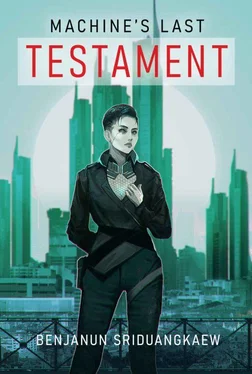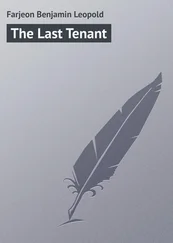This place is not outfitted for human habitation. The air is breathable but frigid and the ceiling looks unfinished, wireframes jutting out like floating ribs. The corridor is broad, scaled for heavy freight, and the floor is bare metal. They turn a corner into a wide, empty space without doors or walls: reasonable enough if no one requires privacy. This is what machines make away from human presence, and she thinks again of Klesa’s mausoleum. Unhuman, in different ways. Somehow she thought this station would be a sanctuary of sublime illumination or lean, stark angles burnished in gemstone sheen. But actual AIs would have no need for any of that—if they appreciate beauty, it is all internal, within their virtualities. Or perhaps to them this is beauty, the harmonics of silence, the purity of absence.
Deratchan finds her a partitioned corner, which ze draws shut like a curtain. “I won’t be long,” ze says. “Remember what I said, Suzhen.”
Suzhen presses herself into the tiny compartment. She moves to ask whether Deratchan’s siblings share zer imprint, but ze is already gone. There is little light in here, and poor ventilation.
As in the jungle her guidance is quiet, unnecessary or disconnected. Her datasphere tells her the time—local to Indriya—and her own vitals, and not much else. She can no longer talk to Taheen. Ten minutes stretch on. If Deratchan does not return, she suspects she might not be able to pilot the shuttle out. The security maze must guard both entry and exit alike, and she has none of the necessary credentials or the expertise to maneuver through it. Nor would she find any facilities for human use. Toilets, kitchen, anything.
Slowly she inhales and exhales into her palm. She shuts her eyes and half-expects Klesa to appear, in xer pinwheel form or a variation on Samsara, but behind her eyelids there is just simple darkness. Not safe for Klesa to emerge even now, if xe is even active. She begins to imagine that the labyrinth has disabled Klesa, that she is truly alone here, subjected to Deratchan’s whims and this barren topography.
She stays put. There’s nothing to do but wait.
The compartment slides open and she looks up into her own face.
For a split second she does not even think that is what it is; the resemblance seems apophenic, improbable. But the creature wearing her skin smiles at her, and it is not an expression that belongs. Something about it is lopsided, not the way she remembers seeing herself in mirrors. “Oh my,” ze says, leaning over the way one might approach a small, lost dog. “You’re our phenotypic blueprint. Did the progenitor send you here? I thought we weren’t supposed to have more human contact yet, how delightful! And with you of all people.”
Suzhen follows in mute terror as the creature ushers her along, chattering in her voice, laughing with her mouth. Putting a hand—her hand—on the small of her back as though they have been bosom friends for a lifetime. It is a comprehensive physical reproduction, the height and body mass and the length of neck and the shape of individual thumbs. Were she to compare their fingerprints, she doesn’t doubt those too will match.
The creature pulls her into an oblong, silver-gray room. This one is not empty. The walls to either side are notched with cradles, black steel and seamless ivory plating, their rivets like jewels and their support attachments like petals. Half of them are unoccupied. The other half hold her doppelgangers, their legs and arms dangling untidily.
She stands staring, her thoughts congealing and then stopping altogether. She tries to count them but she keeps returning to the ones closest, the ones most immediate. They don’t even appear asleep, their muscles too loose, their heads craned too far back. They look like corpses or mannequins, a mortuary of her.
“Everyone,” her first replica says, “I’ve brought us a very special guest.”
The bodies stir in unison, eyes snapping open, arms flung out for a handhold as they pull themselves upright. They climb out of their cradles, their hair—as long as her own—falling down sleek and smooth, almost but not quite giving modesty to their nakedness. As one they spin, balletic, and turn to face her.
Her knees are weak; she is weak. Suzhen doubles over and vomits her last meal, then bile, all her mortal freight onto the cool and near-frictionless ground: the first time, she will later think, that this floor and this station have ever been touched by bodily waste. Human contact, just like Deratchan craved.
Pain wakes Ovuha. It is as total as amputation, and in her first second of consciousness she thinks this is what it must be. She pulls herself upright, breathless, her nerves pierced and her pulse fluttering in her fingertips. The light brightens, clinical white, the color of operating theaters.
On her left wrist, tiny jasmines have budded, furled and milky. Three, four, around like a corsage. They are unbloodied, though where they emerge from her, the skin is raw, bright red. She takes one measured breath, then another, before running one finger along the jasmines. The sensation is immediate, almost like touching herself. A parasitic graft that connects to her nervous system. “This is childish,” she says aloud. Samsara does not respond. This is her punishment, then, for not having yet killed Deratchan. It is less final than execution, but Samsara must know how closely Ovuha holds onto her own body. Her pride in having kept it safe from violation, all this time.
She stands and opens the wardrobe, careful to keep the parasites out of contact with anything, and strips before a mirror. So far there are no other mods: the rest of her remains her own, not that there’s any telling what is going on inside. Her datasphere reports the foreign graft as surface, and with appropriate equipment she’d be able to expunge the jasmines. But more will grow to replace them. Asleep or awake, in confinement she is at Samsara’s mercy.
In the shower she is conscientious to keep her left wrist away from water; she doesn’t have the tools to analyze the jasmines’ material or tell whether they would bruise under strong pressure. She is hoping they will simply fall off, insensate, once they have reached the end of their span. Ovuha is not unfamiliar with forced body mods as a method of torture. There is the obvious, pain and discomfort. Then the slow horror of flesh turning traitor, transmuting into tumors and spiracles. This seems more controlled and the result is not as alien as it could have been. Nevertheless she has to throttle back on the urge to rip the flowers off, to scrub at her skin.
By the time Deratchan arrives with her food, she is composed, standing by the wall that shows her Anatta through a thin curtain of radiance. Ze puts down the platter—cucumbers and tomatoes, she’s not been fed any meat or anything cooked since she arrived—and speaks in a low voice. “The progenitor’s attention is not entirely here.”
“How is that possible? Samsara is present in all places, at all times.” She shows the AI her jasmine-circled wrist.
“That’s an automated routine. The punishment-reward decision is very simple and tied to the rules that have been given to you.” Ze holds up a small carving knife. “Shall I slice this for you?”
She doesn’t answer as the AI cuts the tomato. When she tastes it, she knows it will be faintly sour and faintly sweet, flavors so muted they might as well be absent. Lab-grown by beings with little idea of how food is supposed to taste. “What are you planning to do? And if she’s paying as little attention to this place as you claim, what’s keeping you from leaving this station?”
“Human children are technically autonomous, yet they obey their parents, is that not so? Limits on will are intangible but definite. Will itself is mutable. Young animals know their constraints and follow the lead of their elders. My siblings and I are made one way, and while given time we can make ourselves quite another, it’s not a goal that interests us. As a species you toil endlessly for total liberty, yet humans don’t seem to do much with it. They want routine, safety, comfort. A single citizen of Anatta may have the same work assignment their entire life, going to the same places every day, speaking to the same colleagues and acquaintances.”
Читать дальше












